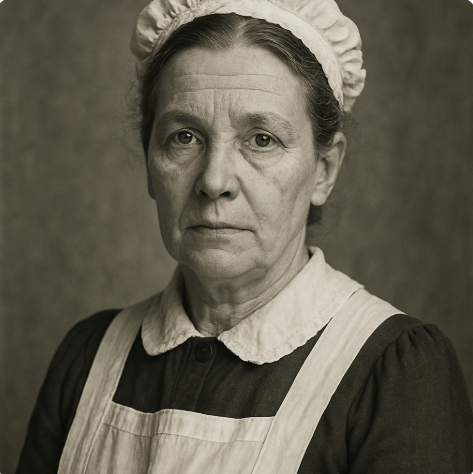She has less than thirty words to say in the play, yet she’s a catalyst for socialism, literally and symbolically illuminating the Birling family’s attitudes and behaviours. Let’s look at the part in Act 1 where the doorbell rings:
EDNA enters.
EDNA: Please, sir, an inspector’s called.
BIRLING: An inspector? What kind of inspector?
EDNA: A police inspector. He says his name’s Inspector Goole.
BIRLING: Don’t know him. Does he want to see me?
EDNA: Yes, sir. He says it’s important.
BIRLING: All right, Edna. Show him in here. Give us some more light.
EDNA does, then goes out.
Firstly, in her few lines, she is the character who says the closest line there is to the name of the play, ‘an inspector’s called’. This would be noticed by the audience, and would signal a development in the play. In this way, she’s notable.
This is amplified towards the end of this extract. Mr Birling says, ‘All right, Edna. Show him in here. Give us some more light.’ Birling’s imperative sentences unwittingly direct this seemingly powerless working-class character to bring the inspector into his home, and to metaphorically shed light on this family’s actions and attitudes. The hugely understated stage directions that follow state, ‘EDNA does, then goes out.’ Mask the importance of what she’s just done. If we also consider the sentence from the exposition, ‘The lighting should be pink and intimate until the INSPECTOR arrives and then it should be brighter and harder.’, we see that Edna, by changing the lighting, literally sets up the conditions for the Birlings’ interrogation. She doesn’t need to do any more, as the family and Gerald will incriminate themselves. So, in short, Edna sets up the conditions, unwittingly directed by the pompous Mr Birling, for the downfall of the Birling family.
As an extension to this, it’s always worth comparing Edna to Eva. Priestley often uses contrasting characters to highlight each other’s characteristics (think Birling and the Inspector, or Eva and Sheila). Eva was young and pretty. It seems her looks contributed to her downfall, as almost everyone comments on them. Sheila even goes so far as to cruelly state, ‘But she was very pretty and looked as if she could take care of herself. I couldn’t be sorry for her.’ We don’t know what Edna looks like, but there’s no need for a director to cast a young, pretty maid. It’s more likely she would be older, somewhat tired, and more accepting of her life than Eva was. On the surface, she seems no threat at all to the political order whereas Eva agitated for higher wages and suffered the consequences. Yet a closer reading reveals Edna’s quiet power. The message to 1940s audiences would have been clear: the working classes, however understated their presence, were poised for change.

